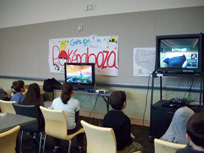Interview with Elizabeth Woolley. She is the founder of the Online Gamers Anonymous organization and is an outspoken opponent of addictive video games.
Mrs. Woolley has been interviewed by the Catholic Herald Citizen, CBC, CBS, and the BBC. She has travelled internationally to speak at conferences on the dangers of gaming. In 2002, she started a website to warn society about the “dark” side of gaming and to provide help and counseling for those who are already addicted to video games.
Crusade: Could you please explain why you founded Online Gamers Anonymous?
Mrs. Woolley: In 2000, my son Shawn became addicted to an online video game called Everquest. Within three months he quit his job, got evicted from his home, and was up all night playing. Despite our efforts to help him get his life back together, he committed suicide only a year and a half after being introduced to the game.
Shortly after Shawn’s suicide, I did an interview with the Milwaukee Journal Sentinel and that’s when I realized how many families are being broken up and suffering like us. In 2002, I founded the Online Gamers Anonymous site so these people would have a place to go and know they are not alone.
I want to warn people that these games can take control of their lives just like drugs or alcohol. Some gamers told me one can become addicted in less than 24 hours. Once a gamer has gone from social gaming to addicted gaming, he can’t go back. Games can be a drug of choice and needs to be looked at that way.
Our website, www.olganon.org spreads research on how gaming affects children, stunting their mental growth and social development, and helps to warn parents. We host several meetings a week where addicted gamers can talk and support one another to turn their lives around and also have a very active forum where different topics are discussed.
Crusade: Do you have any tips for parents who have video games in the house?
Mrs. Woolley: The biggest key is to make sure that your child’s life is balanced. Children cannot be raised on just one activity otherwise they will run into difficulties. Even if the child protests. It is your job as parents to say “no” and guide him towards other activities.
Courtesy of Sean Dreilinger.
Being a parent isn’t easy, but trust me, there was life before video games, and as parents we have to find or make activities to give our children besides sitting them in front of a screen. That means getting them into sports, social events, and educational activities. Alternatives need to be presented. If the child says he doesn’t want to leave the game, you have to set limits, otherwise he will develop problems.
Crusade: Who can get addicted and what are the consequences?
Mrs. Woolley: Anyone can get addicted. Colleges recognize that video games cause a huge percentage of their dropouts. Many now bring in counselors to deal with excessive gaming. Some are asking students if they play games before offering a scholarship. They know they might be wasting a scholarship on a gamer. I know several parents who lost their college funds to their gaming children this way.
Many teenagers being pulled into these games are actually geniuses. They are very intelligent and highly motivated. Proof of this is that many games require hours of tedious effort, concentration and patience. It is very sad to see how all this brilliant mind power is being wasted.
Besides considering how these games are affecting their personal lives and education, we should imagine what could be happening if these very capable people were solving the real problems of society. Instead, video games have become a big part of the dumbing-down of our society.
Fully grown, hard-working adults also get addicted. I know several who had a job and house but lost it all to the games. An extreme case is of a man in Florida who lost his job and had to start living on the street. Now he has a restaurant job and makes just enough to get himself to the gaming café, where he spends the rest of the day. When the café closes he sleeps on the street and does the same the next day.
Many fathers leave their families to spend more time gaming. They don’t care about their children, because all they feel they can do is play.
Grown women tend to play social games like Farmville, SIMS and Second Life because they like to do things with others. This often leads to problems because married women end up leaving husband and family, neglecting their real children, to be with someone in the game. There are many examples of this. An extreme case is the Korean couple who let their real child die of malnutrition because they spent all their time taking care of a virtual baby.
Crusade: Most video games give children a sense of worth and accomplishment. What’s wrong with that?
Mrs. Woolley: One of the main dangers is precisely that it is so very easy to get worth and accomplishment from a game. And if you don’t succeed or like what you did you can just restart until you get it right. Well, real life isn’t like that. Real life isn’t easy and you don’t often get do-overs. So the child grows disappointed with real life and ends up by quitting in real life. He says, “This is too hard,” and runs back to the games.
This poses a huge danger to the child’s social life. Instead of satisfying his desire for things like worth and accomplishment through social interaction, he obtains it through the game. Then he fails to get the experience he needs in real life, especially by suffering and learning how to deal with the bad as well as the good times. Real life isn’t easy for anybody, but allowing a child to use games as a drug to escape reality is not going to teach him how to cope with real life.

Courtesy of San Jose Library.
I could see this in my son. In the game he could easily do whatever he wanted and feel like he was accomplishing something. In the mean time, he was not spending time nurturing his real life, so there was nothing there to sustain him. He no longer cared about the future and advancing in his real life. If most of your time is spent in games there isn’t enough time to enhance real life education, skills or friendships. Anyone who wants real accomplishment needs to get out of gaming and get working in real life.
Crusade: What would you tell parents who use video games to help entertain their children?
Mrs. Woolley: I have seen a lot of reckless behavior by parents because they want to use games as baby sitters. Unfortunately, a lot of it is because many are gamers themselves.
Firstly, giving children a game to get them out of your hair is not being a good parent. Be with your children in real life! I know of a father who taught his 3-year-old child to play World of Warcraft with him because he felt that if he could get his child addicted to it then he could interact with him through the game. I let parents know that gaming with your child is not interacting because almost no words are being exchanged; the child’s only communication with anything is through the controls.
Secondly, I recommend parents not allow any child under 16 to play games connected to the Internet, period. You never know who they are playing against, and pedophiles are figuring out ways to connect with children through these games. Somehow, because it is inside the home, parents think it is safe; but it isn’t. Giving them Internet games is like putting them in a public bar by themselves.
Also, many times parents tell me they can’t help but give what their children want and they don’t seriously look at what is in the game. These games can have sexually explicit material, cursing, drug use, senseless violence and destruction. If this stuff was in a movie, the violence alone would make it R-rated. Most of the Christian families I talk to would never hand their children an R rated movie, but they allow them to interact with violent games. This is very damaging.
Courtesy of Sean Dreilinger.
Crusade: What if the games are non-violent and not online?
Mrs. Woolley: Just because it’s non-violent and not online doesn’t mean it cannot be harmful. That would be like saying it’s alright for kids to be handed non-violent drugs. Again, video games should be viewed as possible drugs and no one should be allowed to become addicted to them.
We really find that when a gamer crosses the line from having the choice of playing to being compelled to play, his mind has actually been rewired by the gaming. He is no longer playing because he wants to but because he has to. Then he starts hating the games but cannot stop. And then, as his life breaks down, he goes into a vicious circle of feeling guilty and having highs on the games, only to plunge back down and return to the game where it all starts again. And while tapping away at controls he becomes dehumanized, giving less importance to his senses, not going outside, getting exercise or sunshine eating good food; he turns into a human shell.
I also believe that more research has to be done but there is already enough information on how gaming affects especially the young, stunting their mental growth and social development. That’s one thing that startled me about my son. He stopped talking to people, including to me, his own mother.
Before getting into this game he was just like the rest of us. He had a future, plans, friends, and a job. After he became addicted it was like a light in his mind was switched off. He no longer cared about how he would spend his real life; he no longer saw a real future; and he had no more goals or principles. He just stopped thinking about reality and became depressed. His whole personality changed and he became anti-social. That’s why I always say these games can rewire the brain and a gamer can change and become a different person. My son’s friends were astounded by how much he actually changed.
Crusade: Could you give an example of how some parents intervene too late?
Mrs. Woolley: One of the boys I knew was a 15-year-old from Canada called Brandon. He was playing a game called Call of Duty and his parents were struggling with him to quit, as they knew it was causing problems. Brandon attached far too much importance to being a very powerful person in this game and wanted to stay in it because of all the fake power and attention he was getting. In 2008, his parents finally decided to put their foot down and took the game from him. Brandon ran away from home and a few weeks later some hunters found his dead body about seven miles from the house. It seems he jumped from a tree.
Crusade: Have addicts talked to you about the gaming buzz causing emptiness in real life?
Mrs. Woolley: Yes, absolutely, and it makes perfect sense because in the games there are always more “missions” and more interesting challenges. The gamers get an adrenaline rush to be able to attain the next level and figure out what to do next. Going on quests and planning cities is all very exciting, and when you go back to real life there’s what? Parents telling you to go sweep the floor, do your homework, do the dishes, and eat at the table; talk with your sister. And then parents are surprised when their children say “life is so depressing,” “everything is boring,” “I have no friends.” It is all because they are spending all their time on games and not experiencing real life; if children had activities, their own groups and friends, real life would be interesting for them.
Crusade: What non-addictive games do you recommend for families?

Mrs. Woolley: A good rule is to have games that have a beginning and an end. Even better would be active games like the wii games since they get people to move around. Moving around gives your body a way to let you know through tiredness when it’s time to stop. Games could also be a social activity and be played against others in the house and not against a machine; and wii games allow this as well. Of course rules still need to be applied. Like other games, the wii games can be taken too far. Once again, all activities need to be balanced.
Crusade: Could you share some more stories from your son’s addiction?
Mrs. Woolley: Yes. After my son became addicted to Everquest and was diagnosed with mental problems, he was admitted to a long-term support program. He was living in a group home five miles from my house. During the night I woke up and couldn’t sleep, which is very rare, so I went downstairs to check my e-mail and heard the front door opening. This was shortly past midnight. Thinking it was a burglar, I got a bat to challenge the thief. Then in walks my son, who was addicted to a game. He had walked five miles from the group home to play it. Who knows how many times he was getting up at night to play the game? Children admit it all the time on my forum that they are spending all night in front of these games without their parents knowing.
Another time my son was at his brother’s wedding, the first wedding in the family. He left during the ceremony to play and didn’t return for the rest of the day. People noticed that he wasn’t at the reception and I discovered he had left in the middle of the wedding and walked home to continue playing his game. My son would have never have done that before his addiction. He loved parties and socializing.




No comments:
Post a Comment